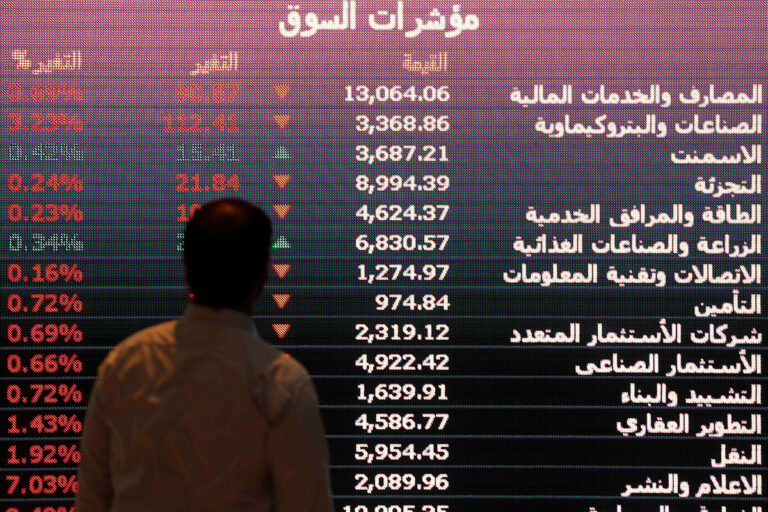The Saudi stock market suffered losses exceeding half a trillion riyals in market value during Sunday trading, as Gulf markets plunged following the outbreak of a trade war between the US and China.
The market decline coincided with falling oil prices and drops in global stock exchanges over the weekend, according to a report by Saudi Gazette.
Saudi Arabia’s benchmark Tadawul All Share Index (TASI) fell more than 700 points (6.1 per cent) to below 11,200 points. Saudi Aramco shares bore the brunt of the losses, with its market value decreasing by more than SR340 billion.
Trump tariffs trigger historic lows for 34 Saudi-listed companies
The market turmoil followed US President Donald Trump’s announcement of a 10 per cent reciprocal tariff on Gulf imports, which took effect on April 5.
Trump implemented the tariff to address what he described as “long-standing unfair trade practices.”
Thirty-four companies listed on Saudi stock exchanges recorded historic lows from the start of Sunday trading until midday.
According to Al-Eqtisadiah business daily, TASI’s 6.1 per cent drop at the beginning of Sunday’s session marked “the largest decline since May 2020, following the collapse in global markets since the US Independence Day, when Trump announced tariffs on his trading partners.”
The Nomu Parallel Market Index also fell 5 per cent by midday, losing 1,600 sessions in its second decline after five consecutive gains. Thirteen companies on the Nomu saw shares fall to record lows.
Aramco shares led the market’s decline, falling 6.2 per cent, followed by Al Rajhi Bank, ACWA Power, and Saudi National Bank, with declines between 5 and 6 per cent.
Half an hour after trading began, volume reached approximately SR2.2 billion, with 130 million shares traded.
Regional markets decline sharply
Other Gulf indices also experienced losses. The Kuwait Stock Exchange fell 6.6 per cent, while the Qatar Stock Exchange dropped 5.5 per cent—both recording their largest declines since March 2020.
The Muscat Securities Market index decreased by 2.1 per cent, and the Bahrain Stock Exchange fell approximately 2.5 per cent. UAE markets remained closed for a Sunday holiday.
In Egypt, the main index EGX 30 fell by approximately 3.6 per cent, with trading on 11 stocks suspended for 10 minutes after they fell more than 5 per cent. The Jordanian Stock Exchange declined by approximately 2 per cent.
Global market uncertainty looms
Global investors face uncertainty as markets reopen after the weekend, with concerns about potential retaliation against US tariffs.
Wall Street previously suffered heavy losses following Trump’s tariff announcement, marking “one of the worst days for stocks since the peak of the sell-off during the coronavirus pandemic.”
Nearly $2 trillion was wiped from the S&P 500’s value, which fell by about 5 per cent.
Trump announced a minimum 10 per cent tariff on all countries exporting to the United States, including Gulf states, with additional tariffs between 30 and 41 per cent on six major countries, including China, Japan, and European nations.
Market observers believe the impact of Trump’s trade policies could extend beyond tariffs to include “disruptions to global supply chains and increased prices for raw materials.”
Countries are now considering responses to Trump’s latest tariffs, which have raised US tariffs to “their highest level in more than a century” and challenged the global trading system established after World War II.
Trump has sent mixed signals about negotiations, indicating last Thursday his “willingness to reduce his tariffs if other countries made a ‘special’ offer.”





